
熟知 雅思口语 考试的同学们应该都对 雅思 口语试题每年的“题库更新”深恶痛绝。面对主观性本就存在的口语现场面试,“新题”如传说中的怪物惊吓了众多考生。口语考场上,最怕面对毫无准备的题目蹦出,造成无话可说的“冷场灾难”。如果新题中的单词听不懂怎么办?就算听懂了新题的题目,但毫无答题思路怎么办?对未知的恐惧让雅思口语变得难上加难。“新题”真的无法提前准备,只能临场随机应变吗?其实不然!首先,大家最好重新理解雅思口语中“更换的新题”。雅思口语的“新题”并非真正意义上的“过去从未出现过的全新试题”,有些所谓的“新题”是很早以前曾频繁出现于考场上的“老话题”。考生之所以不认识这些“熟悉的陌生人“,不过是因为这些考题“中场休息”了一段日子,然后又“重出江湖”。而另一种“伪新题”就更有意思了。正如老话所说“新瓶装旧酒,换汤不换药”。这些“换了新衣”的新题,无非是聪明的考官用了另外一种描述问题的表达方式,将以往的老话题重新改头换面一番,吓坏了不少考生。那我们如何火眼惊醒地看穿这些“变了张脸”的原先的考题呢?当然是淡定审题,理清题意,联想老题,回归本真!由此可见,剩下了极少数个别的“新题”才是官方新增的题目。可也别着急,因为依循雅思口语考试大纲的要求,试题内容永远有关于生活层面,考生只要联系个人感受和经历,总能有话可说。重新理解了“神秘的新题”之后,相信广大考生现在不会再惶恐不安了吧!那就让小站老师带大家一起重温2021年上半年的Part1及Part2考题,温故而知新吧!
Part 1:
基于Part 1是考生开场的第一个环节,想给考官留下不错的第一印象,为最终分数奠定下良好的基础,做到尽可能的完美相当重要。首先,我们来看看Part 1必考话题,这三个话题可谓“万年不变三剑客”,他们是:1. Your Work and Your Studies, 2. Your Hometown及3. Your Home or Accommodation,无疑是全体雅思考生的备课必修入门话题。
并且2021年上半年还出现了一批高频选考话题,连续半年持续活跃在口试考场上,他们是Name, Reading, Visitors to your home, Teachers, Public holidays, Parties, Vegetables and Fruits, Films, Sky, Sleep, Trees, Plants, Mathematics, Weather and Climate, Television, Weekends, Sports, Clothes, Colors, Toys, Friends, Maps, Time management, Letters & E-mails, Newspapers, Collection, Mobile phone, Text messages, Live music, Gifts, Museums and Art Galleries, Public Transportation, Shoes 及Nearby shop or market这几个话题。从这几个高频题目中不难看出雅思口语Part 1的题目依然以“围绕日常生活的主旋律”为出题方向。所以考生在Part 1的备考过程中尤其不能以点概面,模糊作答;而应该有理有据,给出细节,以自己的生活为思路来源,以个人经历感受为具体例子。
Part 2:
虽然雅思口语考试的难度随着Part 1, Part2及Part 3的推进而难度递增,但是大部分考生依然觉得雅思口语的Part 2中要求连续1-2分钟的个人独白是最为“头皮发麻,大脑断片,无话可说”的部分。官方Part 2题库中的题目数量巨大,若想做到将每道题目都进行深入具体的准备练习是不现实也不必要的。另外,Part 2没有必考题目,考生只有通过“撒大网,不错放一个”的勤奋态度,尽可能系统全面的将Part2题库中的核心考题都准备到位,才可以称能面对考官“胸有成竹”。
因此,按照分类掌握Part 2题目,并且合理归纳出核心高频重点话题,以及做到思路敏捷,能有效将这些好用的核心话题扩展延伸至那些相似相通的“新话题”就显得尤其重要。建议考生将雅思口语Part 2以如下五大主题为类别,重点准备每类下面必须掌握的核心高频话题。
(1). People and Animal 人物和动物
1. 大厨
Describe a person you know who is good at cooking.
You should say
Who this person is
What is your relationship with this person
What kinds of food he or she cooks
And explain why you think this person is so good at cooking.
这道题看似“新题”,其实只是把传统的Part2的老话题“a person you know” 和“cooking” 这个本来出现在Part1 的题目移植到了Part2。
2. 穿戴时尚的人
Describe a person you know who dresses well.
You should say:
Who this person is
How you got to know this person
What he or she usually wears
And explain how you feel about the way he or she dresses
一看就可识别的Part2的老话题“a person you know”, 现在做了进一步的修饰限制“dresses well”。轻松便可把 Part1 的“clothes” 话题拿来应用,在谈谈 ”fashion” 就更好了。
3. 外语达人
Describe a person you know who is good at a foreign language.
You should say:
Who this person is
What foreign language he or she knows
How often he or she uses this language
And explain why you think this person can speak this language well.
本话题在2021年就频频出镜,典型的一道成熟的Part2的老话题。
4. 想合作的家人
Describe a family member you would like to work with.
You should say
Who this person is
What kind of person he or she is
Whether you’ve worked together before
And explain why you would like to work with this person (more than with other members of your family)
很明显,这是Part2的老话题“family member”和part1 的经典重复性话题“work”的一次“亲密接触”,将两者结合起来说,问题就迎刃而解了。
5. 有领导力的朋友
Describe a friend who you think is a good leader.
You should say
Who this friend is
How you first met
How other people behave towards him or her
And explain why you think he or she is a good leader.
细一看便可得知,考官将part2的两个古老话题“friend”和“good leader”做了一次合并,考生也可有效合并啦!
6. 让你笑的小孩
Describe a time that a child did something that made you laugh.
You should say:
When this happened
Who the child was
What the child did
And explain why it was funny.
很多考生会误会这道“新题”,其实,这也是过去的老话题经过了一段时间的休假后,重出考场,并披上了一身华丽的新衣“made you laugh”。若留心就会发现,这不就是part1的老话题“Do you want to make other people laugh”的又一次华丽转身罢了。
(2). Events 事件类
1. *运动
Describe an exciting sport you know.
You should say
What the sport is?
How you know about it?
Is it difficult?
And explain why you think it is exciting.
抽到这个话题的,一定是人品爆发的结果,老话题的“不老”神话!
2. 对讨厌的人友善
Describe a time you were friendly to someone you didn’t like.
You should say
When and where it happened
Who he or she was
Why you didn’t like this person
And explain why you were friendly to him or her on that occasion.
整理一下思路,不难发现,将“angry experience”这个话题做了一次升华。考生可以将这个惹你生气的人变成你不喜欢的原因理由,然后再讲“being polite”这个话题有效利用,点出你做到了“friendly”就没问题啦!
3. 隐瞒真相
Describe a situation that others didn’t tell you the whole truth.
You should say
What the situation was
Who was involve d
Why they didn’t tell you the whole truth
And explain how you felt when you found out you were not told the whole truth.
这道题,小心对题意的理解,什么是“didn’t tell the whole truth”? 言外之意,说话者已经告诉了你关于一件事情的一部分真相,而保留了一些信息。千万不要错说成“tell a lie”,说你受到了欺骗,某人对你撒了谎,造成作答跑题的悲剧!
4. 团队合作
Describe something you did with a group of people.
You should say:
What the thing was
When and where you did it
Whom you did it with
And explain why you did it with a group of people or what you learned from doing things with a group of people.
可以将老话题“happy experience”和人物类话题“friends or family members”有效结合来说。
5. 乐于助人
Describe a situation (or a time) when you helped someone.
You should say:
What the situation was
Who the person was
How you helped them
And explain how you felt after helping them.
这个和“give advice”话题,完全相通一致,只需把你获得的建议,说成是你给别人的建议帮助即可。
6. 早起经历
Describe a time when you get up early.
You should say:
When it was
What time you got up
How you felt when you got up
And explain why you got up early.
可把2021年高频出现的Part1话题“Punctuality”和Part2的老话题“traffic jam”合并来说。
7. 教育旅行
Describe an educational trip you took.
You should say:
When and where you went
Who you went with
What you did
And explain what you learnt on this trip.
把part1的“museum or art gallery”和part2的 “happy experience”合并就行了。
8. 童年室内游戏
Describe an indoor game that you liked to play when you were a child.
You should say:
What the game was
When, where and with whom you usually played it
How you played it
And explain why you still remember this game or you liked this game.
老话题“game”和同样的老话题“indoor activity”合并而来的“childhood memory”。
9. 惊喜遇见
Describe a time when you were surprised to meet someone.
You should say:
Who this person was
When and where you met this person
What you said to him or her
And explain how you felt when you met him or her
老话题“famous person”的升级版。
10. 重要的人生阶段
Describe an age of a stage of life that was enjoyable/important to you.
You should say:
When it was
What you did during that period of life
Who was with you
And explain why you think it was enjoyable to you.
将“important experience”和你的“age”,以及家人朋友的重要性结合在一起说。
11. 意见不合
Describe a time you had disagreement with a friend.
You should say:
When and where it happened
What you disagreed on
How you resolved the disagreement
And explain how you felt about the disagreement.
完全可以把对某一富有争议性话题展开来说,比若说居住在大城市的利弊,然后结合“friend”话题。
(3). Object 事物类
1. 玩具
Describe a special toy you had in your childhood.
You should say
What it was
Who gave it to you
How often you played it
And explain why it was special to you.
2. 想*的车
Describe a vehicle you would like to buy (or, own).
You should say
What kind of vehicle it is
What it would look like
Why you would like to have it
And explain why you would prefer this means of transport
3. 以后想*的东西
Describe something you really want to buy in the future.
You should say
What it is
When you will buy it
Where you will buy it
And explain why you want to buy it.
4. 照片
Describe a picture of photograph in your family.
You should say:
When and where it was taken
What’s in it
Where it is placed
And explain why you like this photo
5. 惊喜
Describe a pleasant surprise you had.
You should say
When and where it happened
Who gave you the surprise
Why they gave you the surprise
And explain how you felt about it.
老话题“birthday party”和“gift”的整体升级,国外流行最流行的“surprise party”。
6. 未完成的夙愿
Describe an ambition you have not achieve d yet.
You should say
What it is
When you first had this ambition
Why you had this ambition
And explain why you haven’t achieved it yet.
完全可以借鉴参考老话题“ideal work”进行准备。
7. 奖励
Describe a prize you would like to win.
You should say
What it is
What you need to do to get it
Where you know it
And explain why you would like to win the prize.
老话题“gift” 和“something you want to buy”的升级。
8. 建议
Describe a situation when you received some useful advice.
You should say:
What the situation was
Who gave you the advice
What the advice was
And explain how this advice was useful to you.
9. 有偿工作
Describe a job you ever did or someone you know ever did.
You should say:
What the job was
How did you/this person find this job
How long did you or this person keep this job
And explain how you feel about this job.
(4). Places 地点类
1. 多彩的地方
Describe a place you went to that was full of colour.
You should say
Where it was
Why you went there
What you did there
And explain why you think this place was made so colourful.
结合老话题“park or garden”,“season” 和“colors”。
2. 近水之地
Describe a place near water (such as a river, a lake or the ocean) that you enjoyed visiting.
You should say:
Where this place was
What you did at this place
Who you went there with
And explain why you liked this place.
3. 喜爱公园
Describe a park or garden you like to visit.
You should say:
Where it is
What it looks like
What you always do there
And explain why you like to go there.
4. 地区发展
Describe a change that will improve your local area.
You should say:
What the change is
Why the change is needed
Whether there will be any problems associated with the change
And explain how it will improve your local area.
(5). Media 媒体类
1. 儿歌
Describe a childhood song you remember well.
You should say
Where you first heard this song
How ole you were when you first heard it
What it was about
And explain how you feel now when you hear this song.
老话题“favorite song”的童年升级版。
2. 好消息
Describe a piece of good news you heard from TV or the Internet.
You should say
What the news was about
When you got this news
Where you got this news from
And explain why you think it was a good piece of news.
3. 想重温的电影
Describe a movie you would like to watch again.
You should say
What it was about
When and where you watched it
Who you watched it with
And explain why you would like to watch it again.
4. 教育电视节目
Describe an Educational TV program you have watched.
You should say:
What the program is
What type of program it is
What contents it has
And explain what you’ve learn from this program.
从以上分享中不难发现,雅思口语考试的考题从以往笼统宽泛的话题,向着更为具体和细节的方向发展延伸。并且,考官很热衷于将原来的亲切Part1, Part2的老话题,彼此之间,互相碰撞重组,衍生出了更具有限定某方面细节的“新题”。需要广大考生铭记在心的是,雅思口语考试的初衷不是为了把大家难住靠倒,而是为了考察考生是否有能力在出国后可以与当地人进行较为流畅的英语交流。所以“What you say doesn’t matter, how you say it matters!”正是所谓的:“你回答问题的内容观点不是最重要的,但你如何将你的观点想法有效清楚地表达出来,最好还能地道漂亮的描述解释清楚,自然流利,有理有据。”虽然雅思口语考试朝着更为细节的方向发展,而这会让考生产生一种考题整体变难的感觉,但是雅思口语考试永远来源于生活,适之用于生活,所有考题一定是为了这个目标设定的。所以,考试的话题不会出现真正的“学术性的生僻题或怪难题”,只要考生口语能力到位,打好了词汇和句型的基础,就一定可以应对自如。
2021年上半年雅思口语的整体考情没有异常情况,“新题”也是有迹可循地正常更换升级。2021年的下半年,小站老师希望考生也可以重温这些经典核心考题,根据这些规律备考,预祝还在奋勇战斗的广大“烤鸭们”考试顺利!


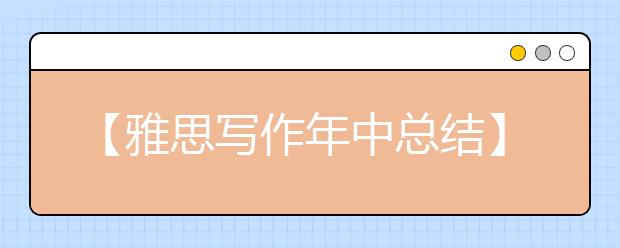 【雅思写作年中总结】2019年上半年雅思大作文考情综述
【雅思写作年中总结】2019年上半年雅思大作文考情综述
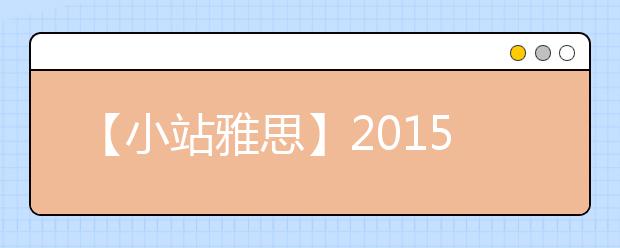 【小站雅思】2019年上半年雅思考情总结
【小站雅思】2019年上半年雅思考情总结
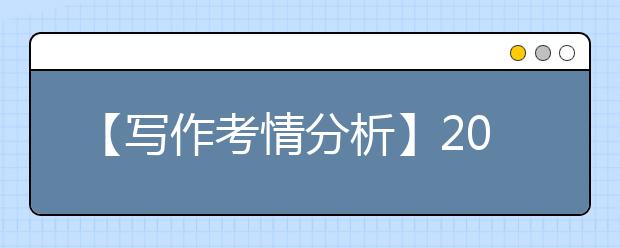 【写作考情分析】2019年上半年雅思大作文考试总结与下半年预测
【写作考情分析】2019年上半年雅思大作文考试总结与下半年预测
 【雅思写作年中总结】2015年上半年雅思大作文考情综述
【雅思写作年中总结】2015年上半年雅思大作文考情综述
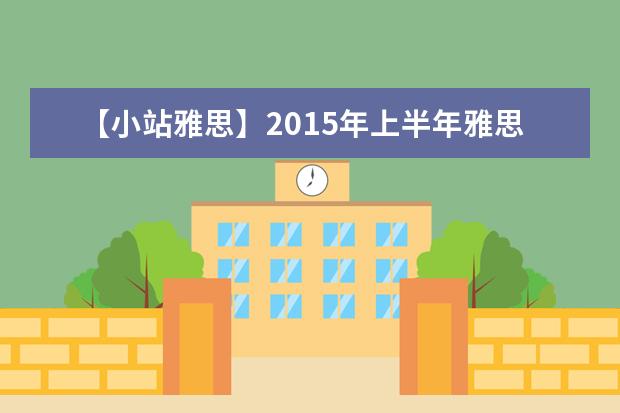 【小站雅思】2015年上半年雅思考情总结
【小站雅思】2015年上半年雅思考情总结
 【写作考情分析】2015年上半年雅思大作文考试总结与下半年预测
【写作考情分析】2015年上半年雅思大作文考试总结与下半年预测
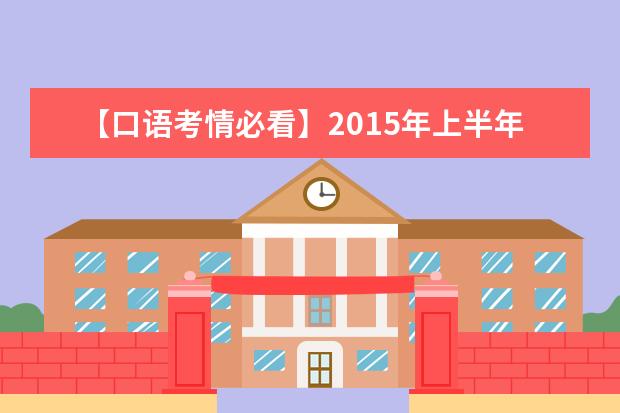 【口语考情必看】2015年上半年雅思口语考情分析
【口语考情必看】2015年上半年雅思口语考情分析
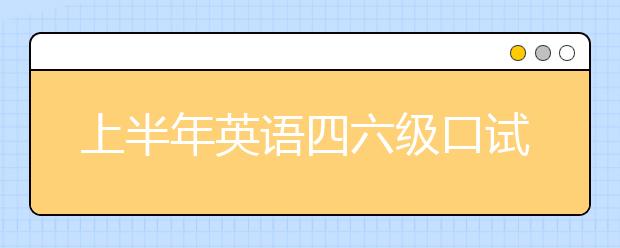 上半年英语四六级口试取消 雅思考试怎么办
上半年英语四六级口试取消 雅思考试怎么办
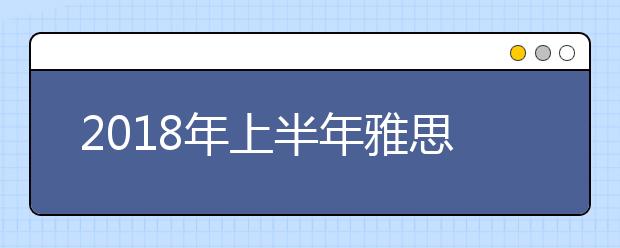 2018年上半年雅思机考报名日期发布
2018年上半年雅思机考报名日期发布
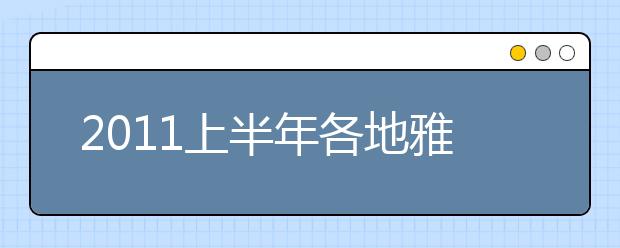 2011上半年各地雅思考试时间及考点
2011上半年各地雅思考试时间及考点
 雅思考试复议服务权威性如何保证?
雅思考试复议服务权威性如何保证? 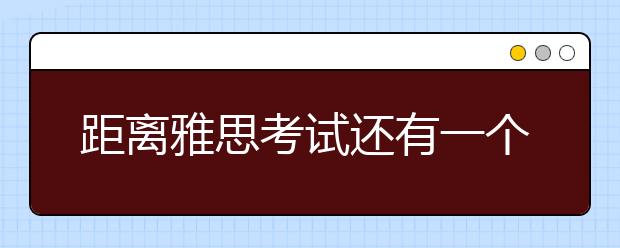 距离雅思考试还有一个月怎么办
距离雅思考试还有一个月怎么办 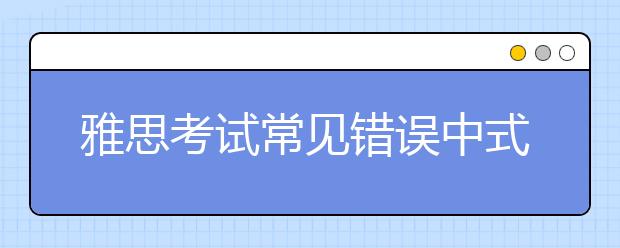 雅思考试常见错误中式表达原因有哪些?
雅思考试常见错误中式表达原因有哪些? 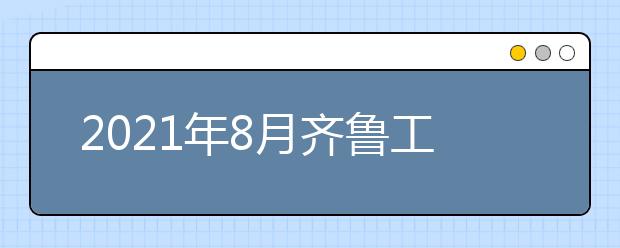 2021年8月齐鲁工业大学考点部分雅思考试
2021年8月齐鲁工业大学考点部分雅思考试  2021年7月取消郑州轻工大及航空工业管理
2021年7月取消郑州轻工大及航空工业管理  去美国读研究生 雅思成绩认可么(请问美国留...
去美国读研究生 雅思成绩认可么(请问美国留...
 英国留学需考雅思哪一类 请问英国留学雅思考...
英国留学需考雅思哪一类 请问英国留学雅思考...
 北欧留学认雅思还是托福? 北欧留学申请条件...
北欧留学认雅思还是托福? 北欧留学申请条件...
 药学专业考雅思出国到哪个国家比较好,还有雅...
药学专业考雅思出国到哪个国家比较好,还有雅...
 澳门留学雅思考试 请问2023年澳门全年雅...
澳门留学雅思考试 请问2023年澳门全年雅...